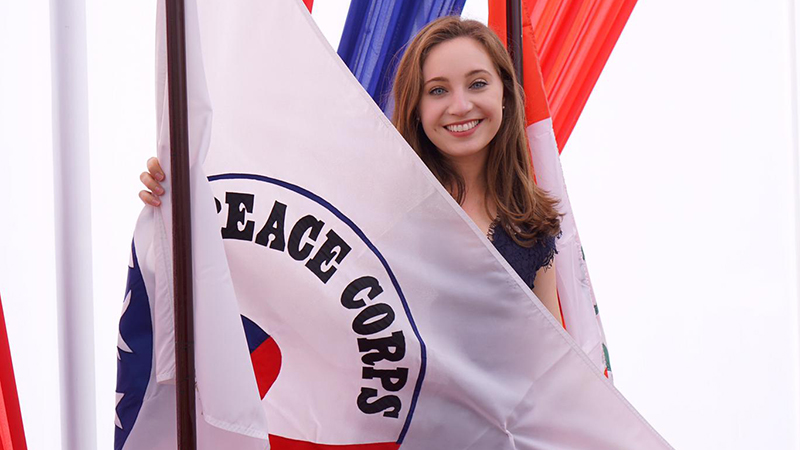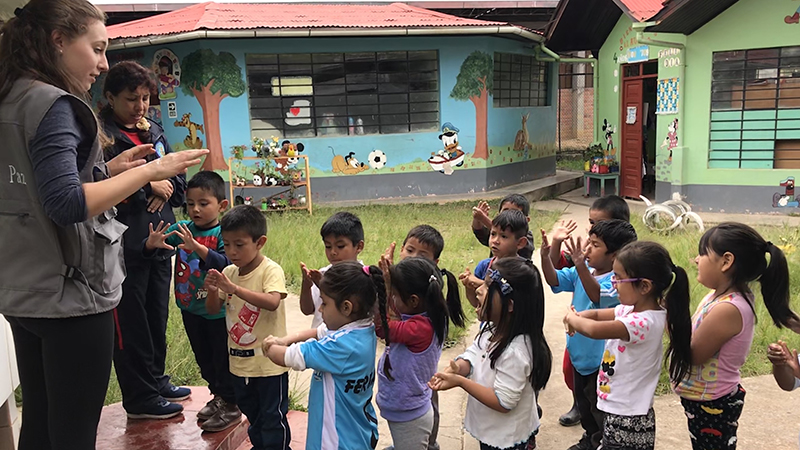
In March of 2020, as the severity of the COVID-19 pandemic began to set in, 7,000 Peace Corps volunteers were abruptly evacuated from countries around the world and returned to the U.S. to await further instructions.
Among them was Nicole Levesque, MS GHPM’21, who had spent the prior year working on water, sanitation, and hygiene improvements in a small rural town in the Peruvian jungle. Though her experience lasted half the time of a typical Peace Corps placement, that year proved formative: Levesque worked closely with the local health post and the municipal government and found she loved being involved with the health system.
Her projects ranged from teaching handwashing in local preschool classes to trekking miles along muddy jungle trails to collect water samples. Along the way she got a first-hand look at Peru’s national health system by partnering with the local health post staff for community outreach. “I saw how streamlined it is, but also how bureaucratic, underfunded and understaffed it is,” she says.

After that eye-opening year in Peru, Levesque abruptly found herself back with her family in New Hampshire amid a harsh New England winter and a rapidly worsening global pandemic. At first, she and other Peace Corps volunteers held out hope that they’d be permitted to return and complete their service. When it became clear that wasn’t the case, she took stock of her options and decided to fast-track her plans to pursue graduate school.
The problem? “I hadn’t taken the GRE, prepared my resume, asked for recommendation letters–I thought I had another year. I had nothing prepared and there was very little time, but fortunately the Heller School recognized the unique situation Peace Corps volunteers were in.”
Levesque applied to the MS in Global Health Policy and Management program, a one-year degree that would allow her to get back to work quickly. And in a twist no one could have foreseen, she completed her entire Heller degree online, never even setting foot on Brandeis’ campus.
“Even in a pandemic, even with everything going wrong in the world, Heller did an amazing job of keeping everything on track and continuing to offer this program to people who needed it and who wanted to get back into the workforce,” she says.
“I went from being in rural Peru, where my cell phone barely worked and I was surrounded by people all the time, to spending all day alone on my computer. It was harder than I expected at first, but we were all really patient with each other and that helped a lot.”
Despite the barriers of technology and the distance, Levesque made connections with other students, including another returned Peace Corps volunteer stationed in Peru who she’d never met until they both enrolled in Heller. They used their classes as an opportunity to gain some closure on their Peace Corps service by focusing on Peru for group projects and expanding on their experience in a new way.
Levesque opted to enroll in the MS program’s Data Analytics STEM concentration, a decision she made with some trepidation but ultimately grew to embrace. “I’m so happy I did that,” she says. “I was intimidated because it was more math than I’ve done in a long time, but I really enjoyed it. I realized that I love health economics, so much so that I decided to pursue it further after I graduated from Heller.”
In particular, she credits Professor Don Shepard’s course on cost-effectiveness and MS program director Moaven Razavi’s course on health care data analytics with preparing her for the career she has now. Today, Levesque is a program analyst at the Centers for Medicare and Medicaid Services (CMS) and part of a policy team that manages the health care insurance plans offered through the Exchanges created by the Affordable Care Act.
One of her current projects involves efforts to address the health literacy gap. She says, “It wasn’t too long ago that I had to learn what a deductible is. Knowing how to select a health care insurance plan is complicated and takes time to learn—a lot of people don’t have that kind of time or the educational opportunities that I’ve had. We’re trying to make sure people understand the plans they’re enrolling in and that they are choosing the best option for their needs.”
“I like knowing that any positive changes that I make are going to result in helping people access better-quality care.”
Levesque is contemplating an eventual return to grad school someday down the road, but, for now, she’s happy to be a civil servant again and more than content to continue learning about the landscape of health policy in her role at CMS.
She adds, “I have such gratitude for Heller, even though I’ve never set foot on the campus. Heller was there for me and for many other Peace Corps volunteers when we really needed it. It has gotten me to exactly where I wanted to go.”
